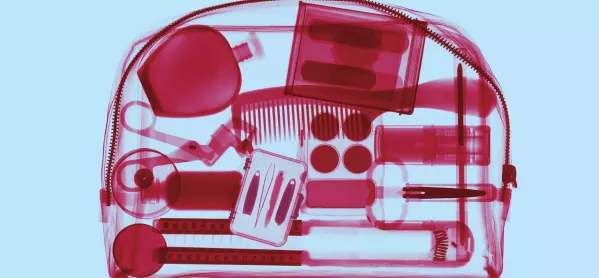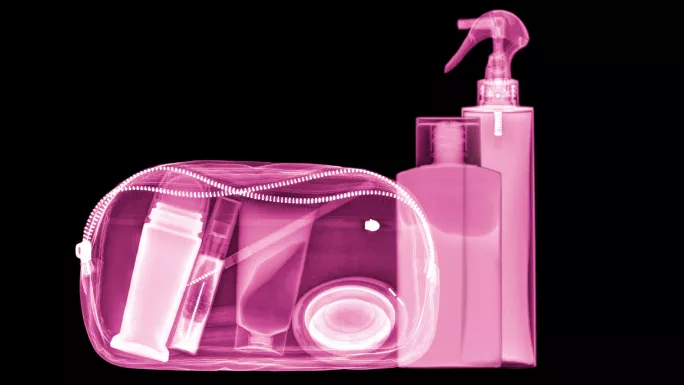- Home
- Seven reasons to remove your make-up ban
Seven reasons to remove your make-up ban

It’s about time we stopped attempting to root out, punish and ban the wearing of make-up in schools.
Yes, I mean we need to stop enforcing rules about make-up completely - and not because I’m into permissiveness or a secret Juggalo (for the uninitiated, the latter is a fan of the group Insane Clown Posse or any other Psychopathic Records hip-hop group).
Make-up is a feminist issue, and even more than that, it’s about consent, control and mental health.
Not convinced? Here are seven reasons with which I hope to persuade you:
1. You can’t ban make-up completely, even if you want to
Practically, you simply cannot ban make-up. The whole point of most cosmetic products is to be subtly enhancing. Search “no make-up make-up” if this is news to you.
Sure, you can spot blue glitter nail varnish at 20 paces but make-up is a spectrum, not a binary - from the most subtle of subtle sheens on a lip balm, to the tiniest glittering particles in a moisturiser, to the softest of coquettish blush to the cheek, all the way to full-on Bowie-style face paint.
If you try to ban make-up, you are banning noticeable make-up that the teachers in your school happen to notice on a given day, according to their whim, their mood, their eyesight and their own background. Inconsistency rules this game, and playing with inconsistent boundaries is something children are pretty damn good at.
2. Banning make-up cuts off important dialogue
Banning make-up teaches pupils nothing about personal presentation, perception and context, except that this stuff somehow “doesn’t belong” in a place of learning.
Ha! Imagine trying that one on university students.
I would ask you to carefully consider why my wearing eyeliner might in any way, shape or form affect my ability to paint, run, or solve equations?
The clue is in the hundreds of thousands of women - and men, oh yes, we will get to this soon - around the world doing these things every day at a professional level while wearing make-up.
Make-up does have an impact, but in a positive direction.
“When one’s body is disliked because of deviation from norms of function or appearance, replicated evidence shows that anxiety, insecurity and low self-esteem are regular correlates,” says a study by Jourard (1964).
Meanwhile, higher self-esteem causes people to speak up more in group situations (Baumeister et al, 2003) - and we are forever banging on about the problem of girls not speaking up in class.
But the cosmetics industry and its interplay with beauty ideals, gender, race, weight and identity is something we absolutely must be talking about in schools. There are two sides to this debate, and banning make-up outright shuts that crucial dialogue right down.
3. A ban creates conflict
Let’s talk about spots. And scars. And burns. And birthmarks. And skin conditions like vitiligo, rosacea...
I know many adults who use products to hide, minimise, cover up - these are often confident people with good mental health, who still prefer to make these small changes to their routine as a matter of personal preference.
Imagine for a second the hideousness of adolescent self-awareness, compounded by a significant physical source of insecurity that looms powerfully over your daily interactions.
Are you suggesting that we should strip these pupils of their right to use cosmetics to make themselves feel more comfortable at school? And that cosmetics are causing the distraction here?
Let’s also talk about gender. This is not just a female issue, and is much more likely to affect LGBT+ pupils as they play with ideas of self-expression and identity.
Putting these pupils in the impossible situation of choosing between following school rules or pursuing their urgent need to fit in or break out is irresponsible and thoughtless.

Part of the dialogue around cosmetics that replaces a ban should be related to gender, including a proper discussion of non-binary identities and how make-up facilitates multiple identities.
I’m also tired of explaining that boys and men want to and do wear make-up - and if we’re going to break down gender stereotyping, tackle toxic masculinity and break open the narrow definitions of attractiveness that society dictates, they need to be completely included in this conversation, too.
But I think the following is the crux of the issue: some schools appear to be living in la la land of ye old fairy tale where the tired narrative goes that a princess is born beautiful, inside and out, and needs no earthly embellishment.
Yawn. Fairy tales can be so damaging.
We want to tell our pupils that they don’t need make-up - and that’s an important idea - but society is shouting at them even louder that they absolutely do.
By dealing with this in such a heavy-handed manner - an outright ban - schools are simply creating unbearable conflict for some pupils, with a clash of strong forces pushing and pulling at the same time.
Newsflash: this is seriously bad for our pupils’ mental health.
4. Banning make-up won’t stop people relying on it
Many teachers are horrified at the idea of pupils getting up an hour early before school to put on their faces, sad that their childhood is being used up in this way.
But some studies suggest that around 44 per cent of adult women don’t leave the house without make-up.
And just look around you. Wearing make-up is a “cultural norm” based on perceived value (Silverio, 2010). Our pupils are watching television (on which every single person is wearing make-up), reading magazine and online content (where much, if not all, of the content is digitally retouched) and hanging out on social media with both its physical filters and filters of image choice.
Our pupils are confronting hugely important issues of identity through experimentation, expression and imitation - and Turner et al (1997) found that the media shapes, rather than reflects, societal perceptions of the body.
All this adds up to something that we must be addressing - but, emphatically, not through bans. Let me ask you this: how many pupils are you asking to remove their make-up, time and time again - yet they’re still putting it on? How many pupils leave schools that banned make-up only to become heavily reliant on it as adults? How many adults do you know who won’t leave the house without their face done, or who get up earlier than their partner to prepare themselves?
I passionately care about this stuff, too. But banning isn’t solving the issue, evidently.
5. Make-up isn’t the distraction you think it is
As a secondary maths teacher, one of my greatest battles was against pupils putting on make-up in lessons. It was messy, distracting and rude, and often accompanied by feet on the table and languid chats about the weekend. But let’s not be naive - that was NOT about the make-up. That was about the behaviour issues in the school, where the make-up was just a proxy - for some children, it was other stuff, like footballs or mobile phones.
I am not, at all, advocating that we allow students to spend valuable lesson time applying make-up, except in the most extreme of circumstances - and that’s up to your considerable expertise as a teacher to decide. I’m saying, if children are putting it on in lessons it’s not an issue with the make-up or an argument against them wearing it.
6. Your preference is not a good enough argument
I’ve just come back from rugby training, for which I wore some rather dashing scarlet lipstick. During my journey home, one charming gentleman thought (very loudly) that I was “fit”, while another seemed to think that my morals were somewhat lacking and that I should be emphatically told so.
We live in a world where men try to control women’s bodies in almost every way, freely expressing their desires and opinions as if being in their gaze is the only point of female existence. We are still stuck between the ridiculous Madonna/whore paradigms where the way we paint our faces is read as a binary signifier of what we do with our genitals.
Schools: we must be at the forefront of breaking this stranglehold. Whether you “like” a student’s make-up is immaterial. If a pupil is wearing make-up that you think is sexualising, that is your problem, not theirs (make-up used to be worn for religious reasons; times change). If you are offended by a pupil’s apricot lipstick or lilac eyeshadow, so what?
Every generation loves to change the rules on what is deemed attractive, and that is their prerogative.
7. Publicly removing make-up is humiliating and controlling
A school ban inevitably leads to a confrontation with the make-up wipes. This scene can often be public and it is always humiliating. If you have never seen this in action, allow me to describe it for you: imagine that I, an adult female woman, went to work one day and was asked to remove my mascara by a superior who then watched me do it.
The mascara-wearing itself may be quite immaterial; while some make-up may be used in an unhealthy, dependent manner, plenty is joyful, colourful self-expression. Sometimes, I choose not to wear mascara to work; sometimes I do. If someone tried to take away that choice, I would feel utterly humiliated. If they did it in public or watched me, the feeling would be compounded to a pretty unbearable degree. This process is degrading and relationship-destroying for both teachers and pupils, and needs to stop.
So - what now? I hope I’ve convinced you that a blanket ban is a terrible idea. I would recommend talking to pupils and teachers and creating a considered school policy that doesn’t just “do what we’ve always done”.
Lucy Rycroft-Smith is a teacher and education writer. She tweets @honeypisquared
Keep reading for just £1 per month
You've reached your limit of free articles this month. Subscribe for £1 per month for three months and get:
- Unlimited access to all Tes magazine content
- Exclusive subscriber-only stories
- Award-winning email newsletters



